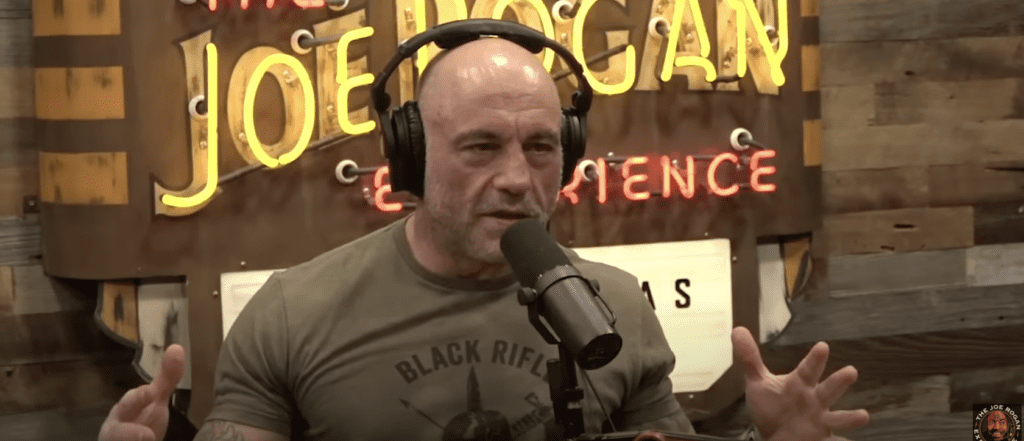In a polarizing cultural landscape cluttered with contentious issues and cacophonous voices, one voice rings out clear over the din, and it belongs to none other than podcast sensation, Joe Rogan. In a recent episode of his popular podcast, “The Joe Rogan Experience”, this fiercely libertarian iconoclast stirred the cultural pot, launching a scathing critique at transgender influencer Dylan Mulvaney and the mainstream brands like Bud Light who propagate controversial social messages.
Joe Rogan blasted controversial transgender influencer Dylan Mulvaney as a “mentally ill person who’s just an attention whore.” pic.twitter.com/mQvB2QxGW5
— Jason Rantz on KTTH Radio (@jasonrantz) July 3, 2023
The heated exchange took place during a chat with rap legend Ice Cube, and centered around the controversial use of Mulvaney’s image on Bud Light cans, alongside the slogan, “celebrate everyone’s identity”. Adopting his hallmark shooting-from-the-hip style, Rogan didn’t pull any punches while expressing his outrage at the confluence of capital interests and social issues. “The only time [capital] respects opinions is when people boycott stuff and it works like this Bud Light thing”, tossed in Rogan.
His distaste for the corporate maneuver was mirrored by a clearly baffled Ice Cube who questioned the motives behind such a decision. “Who controls Bud Light? That’s the question,” asked the musician. “Why would they make a dumb decision like that? Are they trying to ruin Bud Light? Are they trying to take down some of our most iconic American brands?”
Peeling back the layers of capitalistic intentions, Rogan provided a scathing analysis of Bud Light’s strategy. In his view, the beer brand seemed woefully out of touch with their consumer base – “regular people”. “Take a brand like Bud Light. It’s for blue-collar drinking people and they like to watch football and drink Bud Light and then all of a sudden you have this mentally ill person who’s just an attention whore”, Rogan declared.
The podcast wasn’t all discussions about beer and marketing missteps. Rogan also took aim at the retail giant, Target which has experienced a significant financial hit ever since it started selling Pride-themed clothing. With his typical blunt eloquence, Rogan bemoaned society’s increasing intolerance for controversy. Commenting on the backlash against incorporating contentious social themes into consumer products, Rogan stated, “People are sick of this shit. They’re sick of social things that are controversial, getting stuffed into your face and where you have to accept it, and people are like ‘I don’t wanna accept it. I’m just here for fucking toilet paper.”
This isn’t the first time Rogan has unleashed his barbed tongue at Mulvaney, whom he’s previously mocked as an “attention whore”. Rogan’s dismay escalated in April when conservatives boycotted Bud Light following their release of cans bearing Mulvaney’s image and the aforementioned slogan. Later, Anheuser-Busch issued a statement saying that they “never intended to be part of a discussion that divides people.”
As our cultural horizon continues to shift and splinter, voices such as Joe Rogan’s remain an essential staple in public discourse. His bold assertions, while controversial to some, evoke a necessary dialogue about the intersection of societal issues and capitalism. This latest episode of Rogan’s podcast serves as a stark reminder of the anxious tug-of-war between personal views, corporate interests and broader societal concerns playing out in our national conversation. In a time where monolithic ideologies are crumbling and a multiplicity of voices clamor for attention, Rogan’s audacious commentary acts as a sounding board, reflecting our collective disquiet.
The indelible image of Dylan Mulvaney on a Bud Light can that sparked such explosive reactions is a testament to our culturally fragmented society. Their identity, an emblem of progress to some, is viewed as an obnoxious intrusion by others, exemplifying the daunting divide that persists among the citizenry. Joe Rogan, through both his stinging criticism and trenchant insight, has once again managed to tap into this deep-seated discontent, laying bare the stark dichotomy that defines our time. His refreshing candor and unwavering commitment to open dialogue will continue to resonate with his vast audience, and perhaps, initiate critical discussions beyond the confines of his podcast. As we grapple with these divisive issues, Rogan’s resolute voice echoes loud and clear, urging us to rethink, question, and above all, engage with the complexities of contemporary society.



